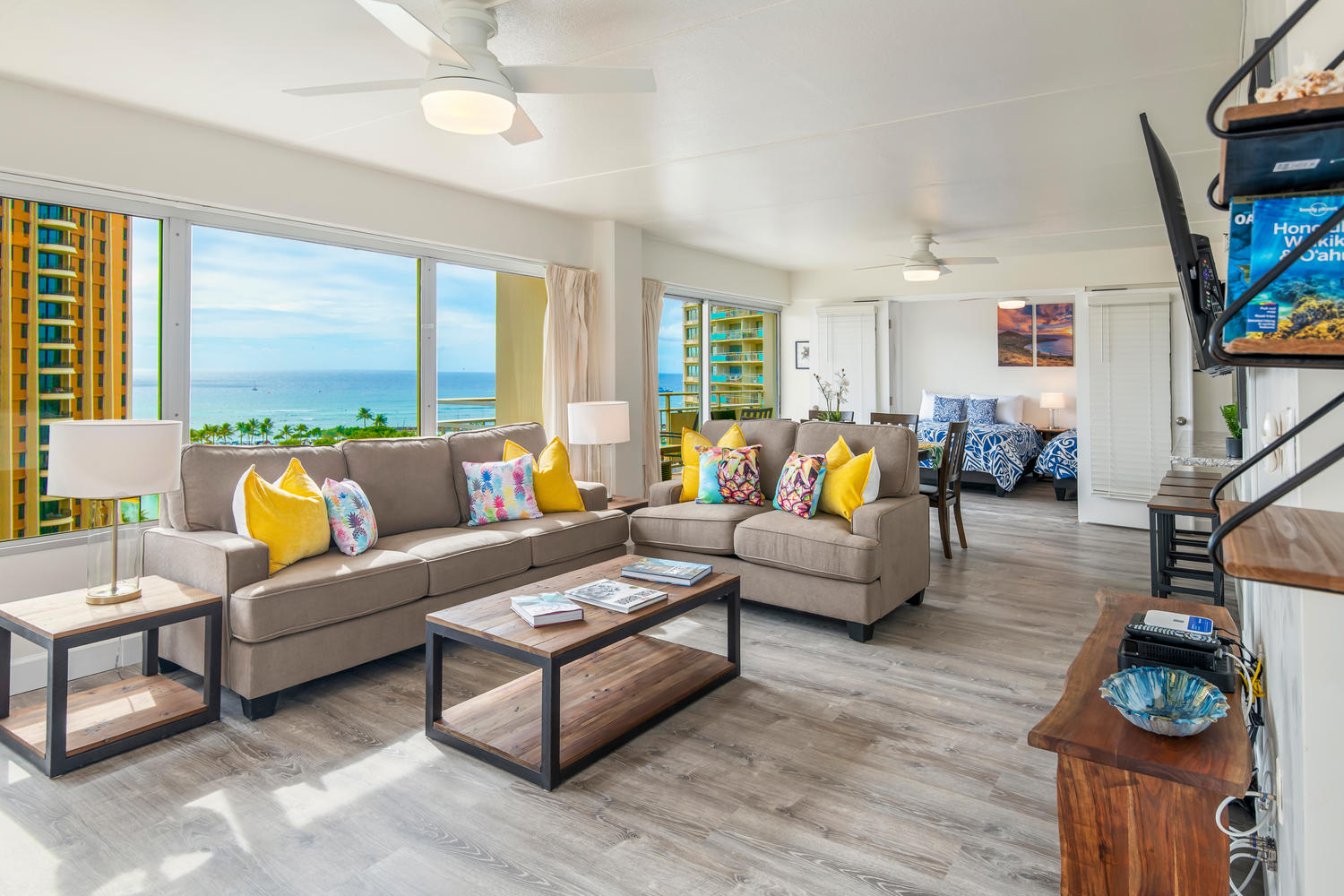Take Your Rental to the Next Level with a Vacation Rental Property Business Plan
In 2020, the number of vacation rental users is projected to surpass 793 million people. This growth has been spurred by apps and websites that make it easier than ever to list and rent short-term rentals of private rooms, apartments, or holiday homes. There’s no doubt—vacation rentals are a booming business.
Do you own a property you’d like to use for vacation rentals, or are you thinking of investing in one? An important step to taking your business to the next level is developing a vacation rental property business plan.
| You are reading an article from the How to Start section of our Ultimate Vacation Rental Business Guide.
See the other articles in this section below: • How To Start a Vacation Rental Business ➜ Vacation Rental Property Business Plan |
Why You Need a Vacation Rental Business Plan
A vacation home business is more than simply listing your property and waiting for money to roll in. Beginner real estate investors can easily make the mistake of jumping in without a plan and then getting in over their heads. In order to be a viable business, you need to treat it as one. That starts with a business plan.
Your short-term rental business plan will help you outline your goals, define the strategy to guide your business, identify potential risks, and help you secure funding from lenders or investors. It can also be a useful tool as you move forward. You can refer back to it to make sure you’re going in the right direction.
What to Include in Your Short-Term Rental Business Plan
For property owners venturing into the vacation rental business for the first time, knowing how to write up a comprehensive business plan can be tricky. For veterans who have a plan already, it’s good to periodically review it to ensure that it’s up to date.
This sample vacation rental business plan template will help you either get started or make sure your plan is still on the right track.
1. Executive Summary
Don’t let the title scare you. An executive summary is just a short section that sums up your vacation rental business—what it entails and what it has to offer.
Things to include:
- The history of your business, with prior successes and accomplishments
- Information on current properties, employees, and third-party vendors
- Future goals for your business
TIP
Use who, what, where, when, how, and why to ask yourself questions about your business. Then answer them in your executive summary. For example, where is your vacation house located, what kind of rental is it, and who is it for?
2. Company Description
The company description explains the Unique Selling Points (USPs) your vacation rental business brings to the market.
Things to include:
- Your unique characteristics and offerings
- Target customers (the type of guests your business attracts or you hope to attract)
- How your business stands out in the market
TIP
Ask yourself how your business is different (and better) than other rental properties out there. For example, is it better because of location, price, amenities, or interior?
3. Industry Analysis and Strategy
To be successful in the rental business industry, you need to be strategic with your vacation property management business plan.
Things to include:
- Where you currently stand in the vacation rental market
- The size of the market
- Current trends and expectations
- Your strategies for achieving bookings in the future
- Technology that may be required to grow your business
- The online and offline channels you plan to use
- Costs for technology, marketing, management, etc.
TIP
Analyze the area where your property is located. Is it a popular vacation spot? Do people travel there for business, leisure, adventure, etc.? How many rentals are in the area? What are the peak times for tourists? The local tourism department or chamber of commerce can be a valuable resource. Consider enlisting a property management company that also offers strategic marketing services, like Grand Welcome.
4. Customer Analysis
Your guests, or customers, are how your business will make money. Therefore, it’s important that you understand them so you can successfully target them. This is the section where you really identify and get to know your target market, so you can make sure your business is giving your guests what they want.
Things to include:
- Buyer personas that identify the types of guests you want to target
- What your customers want/need from a rental property and a vacation
TIP
Think of how your customers would answer typical get-to-know-you questions, like: What do you do for a living? What age are you? What is your family situation? Why do you like to do for fun? Where do you like to travel/vacation?
5. Competitor Analysis
Every successful business plan needs to not only understand their own business and the market but also understand competitors. Find your direct competitors and analyze them so you can find opportunities for your business to come out on top.
Things to include:
- Who your direct competitors are
- How much they charge per night
- Typical amenities competitors offer
TIP
Investigate what other vacation rentals near you charge, who their target audience and clientele are, what types of rentals are most popular (luxury or basic), and what websites/agencies they use for booking and marketing. There are some great tools out there to help, most of which offer short-term rental and data analysis.
6. Operations Plan
Your operations plan is an explanation of how you will run your business. You probably have a lot of this figured out already, so this section might be simple. If nothing else, it forces you to consider all the details of the day-to-day activities involved in operating your business.
Things to include:
- Hiring of new staff
- How to keep track of inventory
- Other administrative duties
- How to manage guest service (customer communication, complaints, etc.)
- Maintenance and cleaning
- Managing finances, taxes, insurance, licenses, payment processing, etc.
- Third-party services like pricing software, etc.
TIP
Evaluate how your current setup has worked so far. Are there areas of your short-term rental business model that could use improvements? This is also a good time to figure out the role you want to play in your business. Do you want to be heavily involved or bring in additional staff to spread out responsibilities? Who will be in charge of what?
7. Revenue Management Plan
You need to keep on top of your incoming money, expenses, and general overall finances when running your vacation rental business. This is the section where you determine all of that.
Things to include:
- Projected vacation rental rates
- Yield management and pricing tools
- Taxes
- Utility bills
- Staff costs
- Target monthly income
- Other costs (supplies, license renewals, etc.)
TIP
There are several great tools and software solutions available to help you make a revenue management plan. Quickbooks is a popular option.
8. Financial Plan
It’s a fact: A vacation rental property business takes investment upfront. The financial section of your business plan outlines how you plan to finance your new business, including the initial property investment and costs for preparing the property.
Things to include:
- How you will pay for a property
- Savings that you will invest
- Loan information (length of the loan, interest rates, monthly payments, etc.)
- Financial projections
TIP
If you are looking at acquiring funding or investors, the financial plan section needs to be more detailed. Include a 12-month profit and loss projection, estimated balance sheet of expenditures, 5-year financial growth plan, cost analysis, and cash flow projection. You may want to work with an accountant.
9. Supporting Documents
You want to make sure only the most important and vital information is included in your vacation rental business plan, but there are other things that would be valuable to have on hand for your business. You can add an appendix for any supporting documents or information that helps keep your business running, like:
- Information for repairs: local plumber, electrician, sprinkler service, etc.
- Tax registration details
- Contracts with third-party vendors
- Permits
- Resumes
- Receipts and/or records of business purchases
- Backup of online bookings and calendar
- Vacation rental industry studies you’ve cited in your business plan
TIP
Make your appendix as complete as possible so you don’t have to go hunting around during tax season or when you have a leaky pipe. By taking the time to compile this information, you can also find where gaps might exist in your planning. It’s better to have a plumber already vetted and in mind before water is dripping from the ceiling on your guest.
Vacation Rental Business Plan Example
We’ve given you the essential components to include in your business plan, but if you haven’t created a business plan before, it can be helpful to look at an example to get a better idea of what that looks like. Here’s an Airbnb business plan template to help you out: Fast Business Plans features a downloadable vacation rental business plan that can be adjusted for vacation rentals.
A comprehensive business plan may also include roles and responsibilities, a SWOT (strengths, weaknesses, opportunities, threats) analysis, sales forecast, pricing strategy, and sustainability and expansion strategy. At the very least, this info can be included in the appendix so you have it if you need it.
Putting Your Vacation Rental Business Plan into Action
A business plan is a great start to grow your vacation rental business. And while you can do it all on your own, you don’t have to. The right strategic partners can help you achieve your goals and objectives, steer you around potential pitfalls, and save you a lot of stress and headache.
To maximize your vacation rental business, here are two major options you can take:
1. List your vacation rental property with Grand Welcome to earn revenue with our easy and comprehensive management program.
The four steps to listing with us are:
- Plan goals and sign agreement
- Evaluation and setup
- Finalize property details
- Your property goes live
2. Open a vacation rental management franchise with Grand Welcome Franchise and work at home on your own time while our experts’ team helps you overall. Start the business with low initial investment with big upside potential. Do you have any questions? Click below to get more information and resources about the franchise opportunity.
- Learn why you should choose Grand Welcome Franchise.
- Read our Vacation Rental Franchise FAQs.
- Request your free Franchise Information Kit.



